#Félix Guattari and Gilles Deleuze
Text
Why does the child die, or the bird fall as though pierced by an arrow? Because of the “danger” inherent in any line that escapes, in any line of flight or creative deterritorialization: the danger of veering toward destruction, toward abolition. [...] Music has a thirst for destruction, every kind of destruction, extinction, breakage, dislocation. Is that not its potential “fascism”? (A Thousand Plateaus, 1980, trans. B. Massumi, 1987, p. 299)
#A Thousand Plateaus#deleuze#Félix Guattari and Gilles Deleuze#guattari#deleuze & guattari#mille plateaux#A Thousand Plateaus: Capitalism and Schizophrenia
9 notes
·
View notes
Text
A true politics of psychiatry, or anti-psychiatry, would consist therefore in the following praxis: (1) undoing all the reterritorializations that transform madness into mental illness; (2) liberating the schizoid movement of deterritorialization in all the flows, in such a way that this characteristic can no longer qualify a particular residue as a flow of madness, but affects just as well the flows of labor and desire, of production, knowledge, and creation in their most profound tendency. Here, madness would no longer exist as madness, not because it would have been transformed into "mental illness," but on the contrary because it would receive the support of all the other flows, including science and art—once it is said that madness is called madness and appears as such only because it is deprived of this support, and finds itself reduced to testifying all alone for deterritorialization as a universal process. It is merely its unwarranted privilege, a privilege beyond its capacities, that renders it mad. In this perspective Foucault announced an age when madness would disappear, not because it would be lodged within the controlled space of mental illness ("great tepid aquariums"), but on the contrary because the exterior limit designated by madness would be overcome by means of other flows escaping control on all sides, and carrying us along.
– Gilles Deleuze and Félix Guattari, Anti-Oedipus: Capitalism and Schizophrenia
Perhaps one day one will no longer know clearly what madness really was...Artaud will belong to the ground of our language, and not to its rupture...Everything that we experience today in the mode of the limit, or of strangeness, or of the unbearable, will have joined again with the serenity of the positive. And what for us currently designates this Exterior stands a chance, one day, of designating us.
– Michel Foucault, History of Madness
#a world created in the process of its tendency#je est un autre#gilles deleuze#félix guattari#michel foucault#anti-oedipus
149 notes
·
View notes
Text

girl,,,
34 notes
·
View notes
Photo

Gilles Deleuze and Félix Guattari, Anti-Oedipus
494 notes
·
View notes
Text
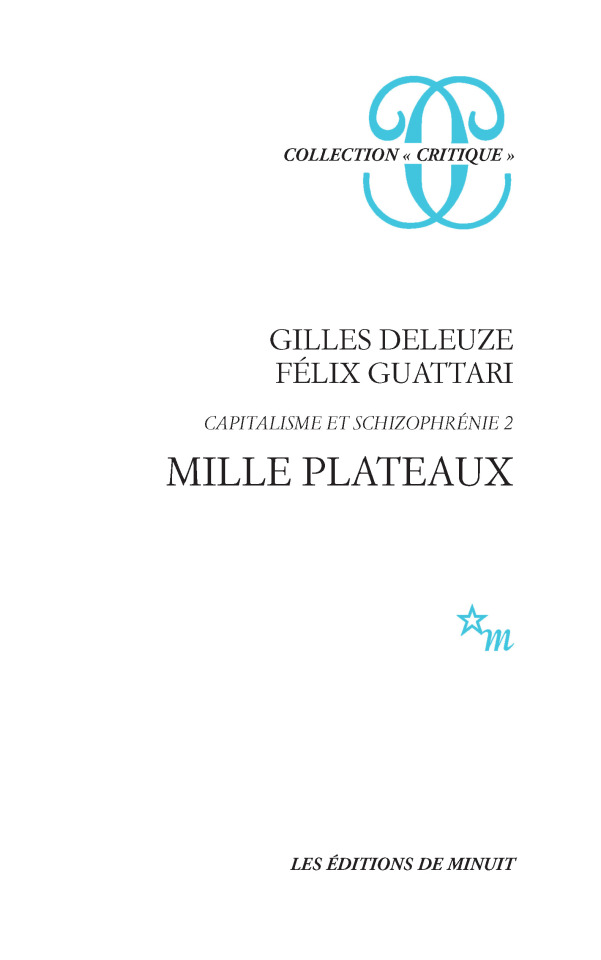
Mille plateaux
Capitalisme et schizophrénie 2
14 notes
·
View notes
Text
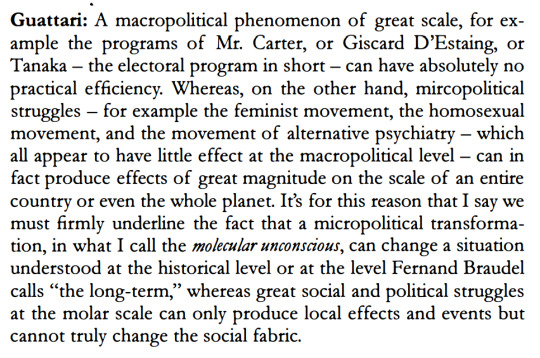
Félix Guattari on the micropolitical vs macropolitical.
Source: Machinic Eros
#félix guattari#guattari#machinic eros#deleuze#gilles deleuze#anti oedipus#schizoanalysis#a thousand plateaus
67 notes
·
View notes
Text

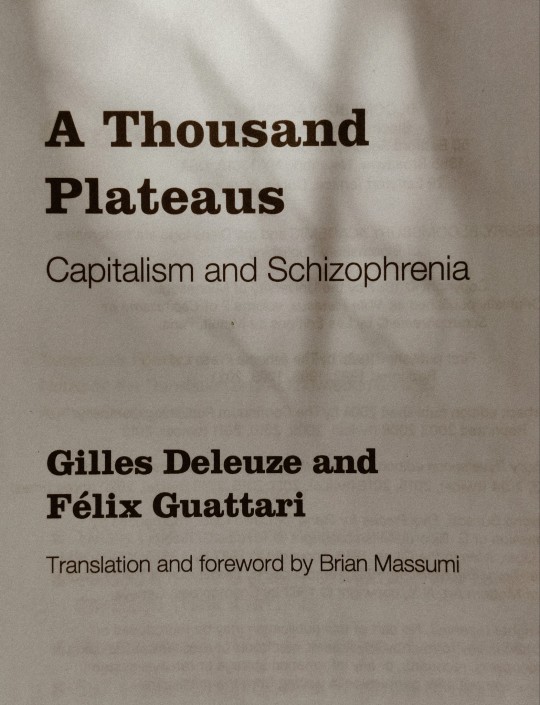
on wednesdays we (try to) read deleuze.
#gilles deleuze#félix guattari#psychoanalysis#george orwell#a thousand plateaus#the road to wigan pier#political philosophy#french literature#studyblr#booklr#dark academia#light academia#dark academia aesthetic#light academia aesthetic#mine#studyblog#bookblog
6 notes
·
View notes
Text

Is this most likely a typo in a shitty pdf? Yes. Am I going to run with the idea that Deleuze and Guattari theorized about the preservation of the Jeff? Also yes
3 notes
·
View notes
Text
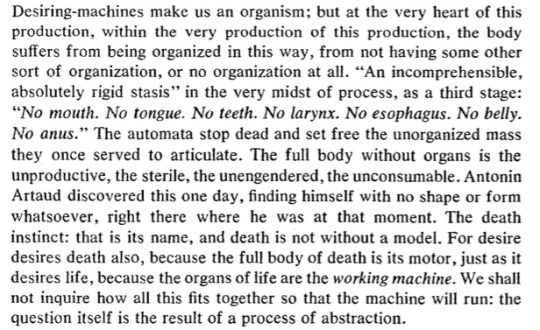
Deleuze & Guattari: Anti-Oedipus
#what i've been saying ‼#gilles deleuze#félix guattari#deleuze and guattari#capitalism and schizophrenia#anti-oedipus
3 notes
·
View notes
Text
It is not simply linguistic, lexical, or even syntactic transformations that determine the importance of a true semiotic translation but the opposite. Crazy talk is not enough. In each case we must judge whether what we see is an adaptation of an old semiotic, a new variety of a particular mixed semiotic, or the process of creation of an as yet unknown regime. For example, it is relatively easy to stop saying “I,” but that does not mean that you have gotten away from the regime of subjectification; conversely, you can keep on saying “I,” just for kicks, and already be in another regime in which personal pronouns function only as fictions. Signifiance and interpretation are so thick-skinned, they form such a sticky mixture with subjectification, that it is easy to believe that you are outside them when you are in fact still secreting them. People sometimes denounce interpretation yet show so signifying a face that they simultaneously impose interpretation upon the subject, which continues to nourish itself on it in order to survive. Who can really believe that psychoanalysis is capable of changing a semiotic amassing every deception?
"587 BC-AD 70: On Several Regimes of Signs", Gilles Deleuze and Félix Guattari, A Thousand Plateaus
8 notes
·
View notes
Text

«Resumiendo, los primeros filósofos son los que instauran un plano de inmanencia como un tamiz tendido sobre el caos. Se oponen en este sentido a los Sabios, que son personajes de la religión, sacerdotes, porque conciben la instauración de un orden siempre trascendente, impuesto desde fuera por un gran déspota o por un dios superior a los demás, a imagen de Eris, tras guerras que superan cualquier agón y odios que recusan de antemano los desafíos de la rivalidad. Hay religión cada vez que hay trascendencia, Ser vertical, Estado imperial en el cielo o en la tierra, y hay Filosofía cada vez que hay inmanencia, aun cuando sirva de ruedo al agón y a la rivalidad (los tiranos griegos no serían una objeción, porque están plenamente del lado de la sociedad de los amigos tal como ésta se presenta a través de sus rivalidades más insensatas, más violentas). Y tal vez estas dos determinaciones eventuales de la filosofía como griega estén profundamente vinculadas. Únicamente los amigos pueden tender un plano de inmanencia como un suelo que se hurta a los ídolos.»
Gilles Deleuze y Félix Guattari: ¿Qué es la filosofía? Editorial Anagrama, págs. 47-48. Barcelona, 1997.
TGO
@bocadosdefilosofia
@dias-de-la-ira-1
#deleuze y guattari#deleuze#guattari#gilles deleuze#félix guatari#filosofía#qué es filosofía#constructivismo#plano de inmanencia#caos#filósofos#sabios#inmanencia#oposición filósofos-sabios#sacerdotes#religión#trascendencia#verticalidad#filosofía griega#amigos#amistad#sociedad de amigos#agón#odios#rivalidad#eris#guerra#guerras#primeros filósofos#teo gómez otero
3 notes
·
View notes
Text
We would say that the refrain is properly musical content, the block of content proper to music. A child comforts itself in the dark or claps its hands or invents a way of walking, adapting it to the cracks in the sidewalk, or chants “Fort-Da” (psychoanalysts deal with the Fort-Da very poorly when they treat it as a phonological opposition or a symbolic component of the language-unconscious, when it is in fact a refrain). Tra la la. A woman sings to herself, “I heard her softly singing a tune to herself under her breath.” A bird launches into its refrain. All of music is pervaded by bird songs, in a thousand different ways, from Jannequin to Messiaen. Frr, Frr. (A Thousand Plateaus, 1980, trans. B. Massumi, 1987, pp. 299-300)
#A Thousand Plateaus#Félix Guattari and Gilles Deleuze#deleuze#guattari#mille plateaux#A Thousand Plateaus: Capitalism and Schizophrenia#deleuze & guattari#quotes
7 notes
·
View notes
Text
Desire knows nothing of exchange, it knows only theft and gift.
– Gilles Deleuze and Félix Guattari, Anti-Oedipus: Capitalism and Schizophrenia
124 notes
·
View notes
Text

Create Art Via Art Piece, 2022
an eco-friendly, diverse and inclusive artwork about the primordial rage you experience in studying philosophy. perfect mix of shitpost and art. suitable for all ages, fun for the whole family. buy now, only 9999999999999999 currencies on killnickland.com. 410,757,864,530 WOKE MORALISTS APPROVE
#euker art#gilles deleuze#félix guattari#deleuze#guattari#d&g#art#digital art#drawing#digital drawing#collage#art collage#before anyone asks no i havent read hegel#i will i prommy#now get off my lawn *punts you*
26 notes
·
View notes
Text
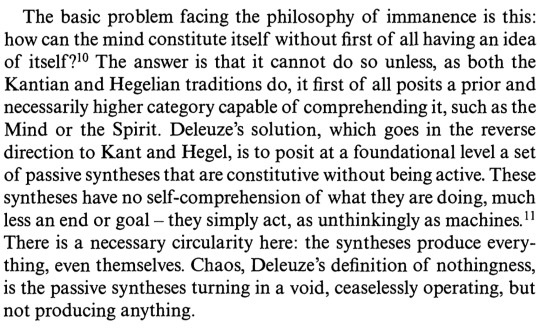
Ian Buchanan, Deleuze and Guattari's Anti-Oedipus
37 notes
·
View notes
Text
Nadie hace el amor con amor sin constituir para sí, con el otro o los otros, un cuerpo sin órganos.
Gilles Deleuze y Félix Guattari, Mil mesetas
5 notes
·
View notes